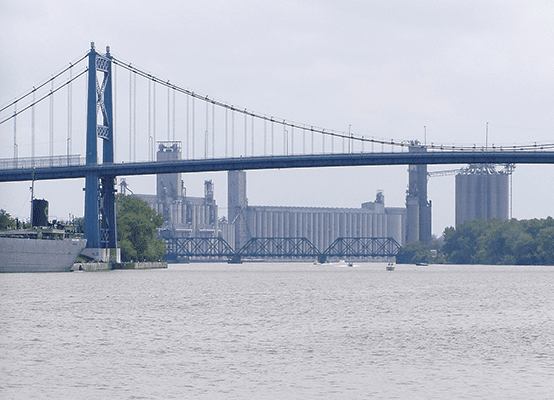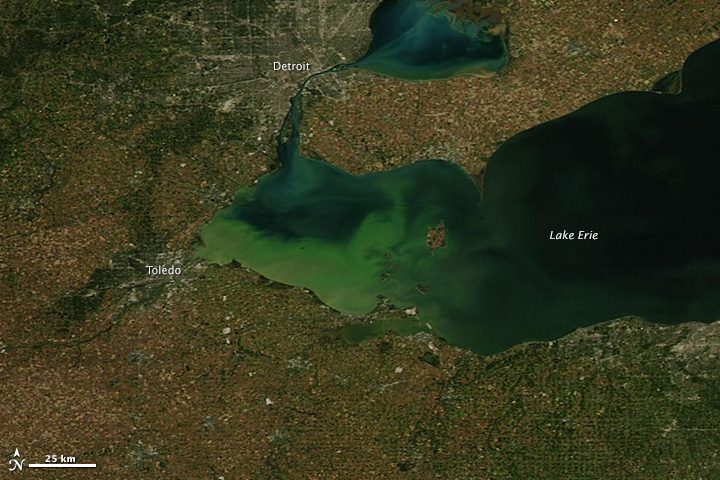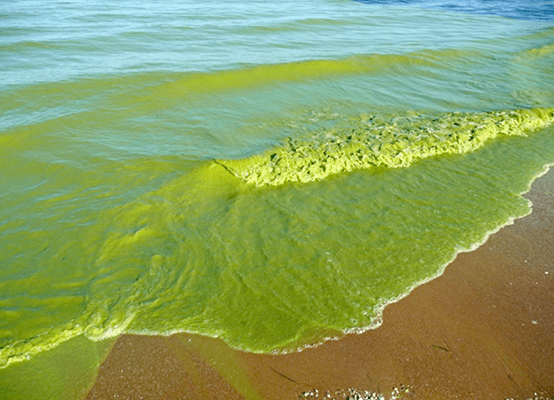Toledo Wants Local Control to Save Lake Erie

TOLEDO, Ohio—About a month ago on a snowy afternoon, driving over the spindly 90-year-old Anthony Wayne Bridge, I couldn’t help but notice how this city seemed stuck in neutral. Behind me was the huge Toledo Refinery, a 280-acre gasoline processing plant, but set in a neighborhood where the houses appeared older and less functional than the industrial site.
On the west side of the Maumee River were neighborhoods with wide boulevards with little traffic just south of downtown, filled with vacant lots, inner-city convenience stores, and grandiose churches from a bygone era. One of those churches was St. Anthony’s, a Catholic church that was once home to Polish immigrants, a gothic structure of brick topped by a 250-foot steeple and built in 1894, but closed since 2005.
Then the radio reminded me why I was in Toledo. I was reporting on the environmental movement in this city that was trying to save the Great Lake it sits upon. “The Lake Erie Bill of Rights” was a charter amendment that would be put on the ballot and could bestow upon this body of water the legal designation of “personhood.” That’s right, Toledo wanted to radically change the legality of the natural environment, basically making this 10,000 square-mile lake it sits upon its child, with the citizens of the Glass City the lake’s legal guardian. In essence, the parents then could sue on behalf of its child if the lake was bullied with polluters.
Obviously, there was pushback on this crazy idea from the agricultural and business community. “What did these groups put in their bill of rights?” the radio ad asked me. “The right to hurt local farmers, the right to hurt small businesses, the right to drive up our food costs.”
Despite the notion that their grocery bill could go up if they voted for Lake Erie becoming a person, the city ordinance passed this week easily, by a 61 percent majority vote. And as predicted by many, the first court case has already been filed stating this measure is unconstitutional, unenforceable, and hurtful to farmers. But in talking to the organizers of this movement in Toledo, you realize quickly that the bill’s passing was more about changing the local political process than succumbing to some liberal environmental ideology that some opponents portrayed them as.
“What we were being told is that we as the citizens of this city had no real say in what was happening in our community,” says Markie Miller, a theater production manager in Toledo and one of the organizers of the ballot initiative. “That way of thinking is inadequate. The federal and state government were defining the environmental rules we lived under, but nothing was changing.”
“So we figured those rules would be better handled by the city government instead of the powers that be elsewhere. It is a trend that I see growing and getting momentum all over the country.”

Some are calling this trend a return to the notion of the “city-state,” like Thebes in ancient Greece or Switzerland’s Geneva in the Middle Ages or Hong Kong and Singapore now. It is a rebranding of “home rule,” knocking down the notion that nothing can happen in the United States unless the federal government and the state legislatures say it can.
To put it more clearly, cities are fighting against the inept largesse of the feds and the states-rights power grab by rural and exurb constituencies in recent decades. It is a movement of urban areas not fully independent of their nation-states, but not beggars or also-rans in the political process with them either.
In their book, Metropolitan Revolution: How Cities and Metros and Fixing Our Broken Politics and Fragile Economy, Bruce Katz and Jennifer Bradley of the Brookings Institute write about this restructured form of federalism taking place.
In traditional political science textbooks, the United States is portrayed neatly as a hierarchical structure – the federal government and the states on top, the cities and metropolitan areas at the bottom. The feds and the states are the adults in the system, setting direction; the cities and metropolitan areas are the children, waiting for their allowance. The metropolitan revolution is exploding this tired construct. Cities and metropolitan areas are becoming the leaders in the nation: experimenting, taking risk, making hard choices, and asking for forgiveness, not permission.
The movement to make Lake Erie a person (in Toledo) fits with this new thinking. In August of 2014, an algae bloom of unprecedented seriousness caused Toledo the city to ban drinking water for 500,000 residents for about a week—and even elderly, children, and pregnant women were not permitted to shower. These blooms in the west basin of Lake Erie are caused by blue-green bacteria or cyanobacteria, single-celled organisms that naturally exist in fresh or salt waters, but grow to dangerous health levels when fed by nutrients from the watershed, often phosphorous and manure runoff from agricultural crop feeding.

After the water was restored, Toledo residents looked around and found that federal and state government had done little to alleviate the ongoing situation. The U.S. Environmental Protection Agency had declared the Maumee River in Toledo an “Area of Concern” in 1987 from the agricultural runoff problem (and it still is). Ohio had tried repeatedly to designate the Maumee River’s watershed and Lake Erie itself as “distressed” numerous times. But business and agricultural interests always fought those designations, along with any solutions that might alleviate the problem more efficiently, and the Toledo citizens found they had few options in dealing with the issue.
“I think what we did was a natural reaction to the idea that things had continued to be worse by following the plan our federal and state leaders had laid out for us,” says Bryan Twitchell, a school teacher in Toledo. “They stood up for interests outside our community in dealing with a problem that was happening within our community. That makes no sense to anyone. We had to change that.”
Are American urban areas becoming more independent city-states than second-fiddle step children under the national umbrella?
Some cities are deciding to get rid of interstate highways (or capping them as parks) when they run through central-city neighborhoods. Some are excising their own gasoline taxes so they can better control road fixing and building. Other cities are seeing that some federal programs actually make affordable housing plans harder to implement and are trying to deal with the issue on their own. Some urban areas are also looking at consolidating power by merging the inner-ring suburbs with the central city.
They are also dealing with mass transit funding, water conservation, and renewable energy more locally. Whether all of this means that America is fast becoming a collection of city-states or clusters of megacities remains to be seen. But today’s political frameworks are changing, as both the right and left find some common interests.
In some ways, what is evolving is that liberal entitlement programs and libertarian free-market independence can not only coexist, but can promote each other in big cities. “We understand that the Lake Erie as a legal entity will be challenged in court cases for some time, and we are prepared to fight those,” Miller says. “But what we found in this election is that we heard from other groups in this country and around the world that are experiencing the same problems. That big government is making it harder to take care of themselves, and not easier.”
“That’s what we experienced and we decided to deal with it ourselves.”
Daniel McGraw is a freelance journalist and author living in Lakewood, Ohio.
Comments